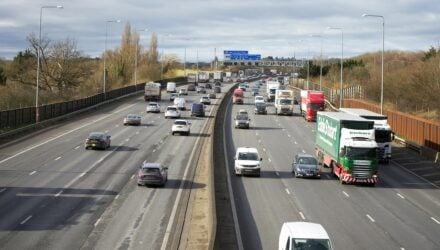Labour published their 2024 General Election manifesto yesterday (13 June 2024) and within its 136 pages – the longest of all published manifestos, sets out Labour’s policy on transport, roads and their plan to phase out ICE vehicles.
Among their pledges, are the promises to renew the road network and tackle one million potholes every year. They have stated that the road network should be safe for all users from cyclists through to HGV vehicles.
They have stated that they will restore the 2030 ICE phase-out date, responding to the concerns of manufactures, and support drivers by tackling the soaring cost of insurance and accelerate the roll-out of charge points.
Finally, they will standardise the information supplied on the condition of batteries for those wanting to purchase second-hand electric vehicles.
Jakob Pfaudler, AA CEO, responding to Labour’s Manifesto, said: “We are pleased that the Labour Manifesto reflects many of the policies outlined in The AA Motoring Manifesto.
“It is vital that the reintroduction of the 2030 new car zero emission deadlines is accompanied by the acceleration of the roll out of charging points, investment in new gigafactories and support for drivers making the switch.
“The AA is pleased that this election has put motorists in the driving seat and that comprehensive policies are being discussed that should help to shape a better road ahead for all drivers.”
RAC head of policy Simon Williams said: “It’s pleasing to see major concerns for drivers, such as local road maintenance and the transition to electric vehicles, high on the list of Labour’s priorities if they win power. However, there is an important issue which is notably absent.
“The previous Government promised £8.3bn of reallocated HS2 funding to resurface 5,000 miles of local roads. With no mention of reinstating HS2, it’s not apparent whether Labour would honour this spending commitment to tackle the nation’s pothole problem. If that proportion of budget – which would only resurface 3% of all council-run roads in England – is no longer dedicated to road maintenance, the proposed £320m from the A27 bypass would not even be a drop in the ocean.
“The promise to restore 2030 as the phase-out deadline for new petrol and diesel vehicles comes as no surprise. Arguably it’s the Zero Emission Vehicle Mandate that’s already in place which is more important, as it’s forcing manufacturers to sell an increasing proportion of electric vehicles over the next few years and should, in itself, help drive uptake.
“However, it remains the case that electric vehicles are still far too expensive for a majority of drivers. The next Government has a great opportunity to stimulate demand by reintroducing a plug-in car grant aimed at the cheaper end of the market. This would make zero-emission driving a possibility for far more people.”
Paul Hollick, APF chair, said: “Unless the polling industry is in the process of making perhaps the biggest error in its history, it looks very much as though Labour will form the next government with a majority, so this manifesto is of very real interest to fleets. The key ideas that it contains are fine in principle but much more detail is needed on the proposals.
“Dealing with them in turn, the 2030 EV production deadline is now of limited importance compared to the ZEV Mandate, which is really the main control mechanism affecting EV sales in the UK. It would be useful to know whether Labour intends to keep the same rate of adoption as currently stipulated. Certainly, there are many people in the wider motor industry, if not perhaps fleet, who would like to see it slowed given current retail EV sales.
“Accelerating the roll-out of EV charge points would be welcome. There is no news in the manifesto document on how this would be done or what kind of targets would be adopted, although Labour has previously talked about removing planning restrictions and providing better guidance to councils, and these measures could have an effect. Especially, there needs to be much greater emphasis on getting chargers in the right places.
“Finally, a government-standardised battery health check would undoubtedly be very useful, providing a high degree of reassurance for used EV buyers, but we also believe that this is an area that almost certainly needs a degree of financial support, such as through used EV grants or low-cost loans. How likely we are to see those moves from a Labour Party that continually stresses the need for financial control is open to question, however.”
Paul said that a manifesto commitment to repair an additional one million potholes every year was a more concrete plan and was very much to be welcomed, as was a promise to retain a full expensing system for capital investment. However, uncertainty over fuel duty would be a worry for some fleets. Shadow chancellor Rachel Reeves earlier this week refused to rule out future increases, although there was no mention in the manifesto document.
“We’ve now had more than a decade of fuel duty freezes, so fleets have very much become accustomed to taxation at the current rate. At a point in time when company transport budgets are very much under pressure, any increase will be very much unwelcome.”
He added that the AFP had recently published its Tax & Regulation Manifesto 2024 and urged the potential new government to examine the ideas it contained as soon as possible.
“There are relatively simple measures that could be carried out by any new Labour government – such as sorting out the ongoing confusion affecting 4.25 tonne electric vans and producing company car benefit in kind taxation tables up to 2030 – that could be done easy and quickly, and would win friends in fleet. We have already spoken to some members of the shadow cabinet in recent months and would hope to intensify this dialogue if the expected election result materialises.”
RHA Director of Public Affairs & Policy, Declan Pang, said: “It is positive to see Labour’s commitment to reform the planning system which continues to hamper the vital infrastructure our industry relies on. We welcome the focus on streamlining the process for Nationally Significant Infrastructure Projects, such as Lower Thames Crossing, and updating the National Policy Planning Framework which are so vital in ensuring we have the right road network and lorry and Coach parking to meet demand. Local Plans play a vital role in the priorities of infrastructure in council areas and we are pleased to see Labour’s commitment to ensure that planning authorities have up-to-date Local Plans in favour of development and we support the commitment to ensure that planning guidance better caters to the needs of businesses as this has a significant bearing on land available for operators to use, as well as other vital infrastructure such as driver facilities.
“We welcome Labour’s plan to prioritise dealing with the scourge of potholes on our highway network. However, this must not come at the expense of deferring schemes which are essential for tackling congestion and creating reliable journey times for hauliers and motorists alike, such as the A27 bypass. One of the first jobs of the new government is to review the third Road Investment Strategy and ensure it is robustly funded. Maintaining our road network should not come at the cost of investing in its future.
“The commitment to allocate £1.8 billion to upgrade ports and build supply chains across the UK through the National Wealth Fund will also have a major impact on our industry and we look forward to working with Labour on this, should they be successful in forming the next Government.
“On taxation, the commitment to retain the full expensing system for capital investment and the annual investment allowance for small business is welcome but we need to see the same commitment for full expensing for leased assets (announced in the Spring Budget 2024). This will prove a significant support to hauliers, van and coach operators, particularly those affected by higher interest rates. With the average profit margin of a haulier just 2%, Labour needs to minimise the financial burden on operators from taxation particularly given that the cost of distribution impacts the prices on our shelves and the cost of living.
“We have long called for reform of the Apprenticeship Levy and are pleased to see Labour have listened to these calls and will create a flexible Growth and Skills Levy. Just 1% of all new HGV licences last year came via an apprenticeship so it is crucial this works better for our industry. The pledge to a more joined up approach to migration and skills policy is also vital to ensure we have the workforce needed, particular where there are significant and escalating shortages in roles such as heavy vehicle mechanics.
“Finally, with the phase out dates for diesel HGVs fast approaching, it is promising that Labour’s National Wealth Fund will support green investment, however there is much work ahead to tackle the barriers to decarbonising commercial vehicles and providing the stable and predictable policy framework needed including a clear and realistic roadmap, financial incentives and investment in energy infrastructure.”


















